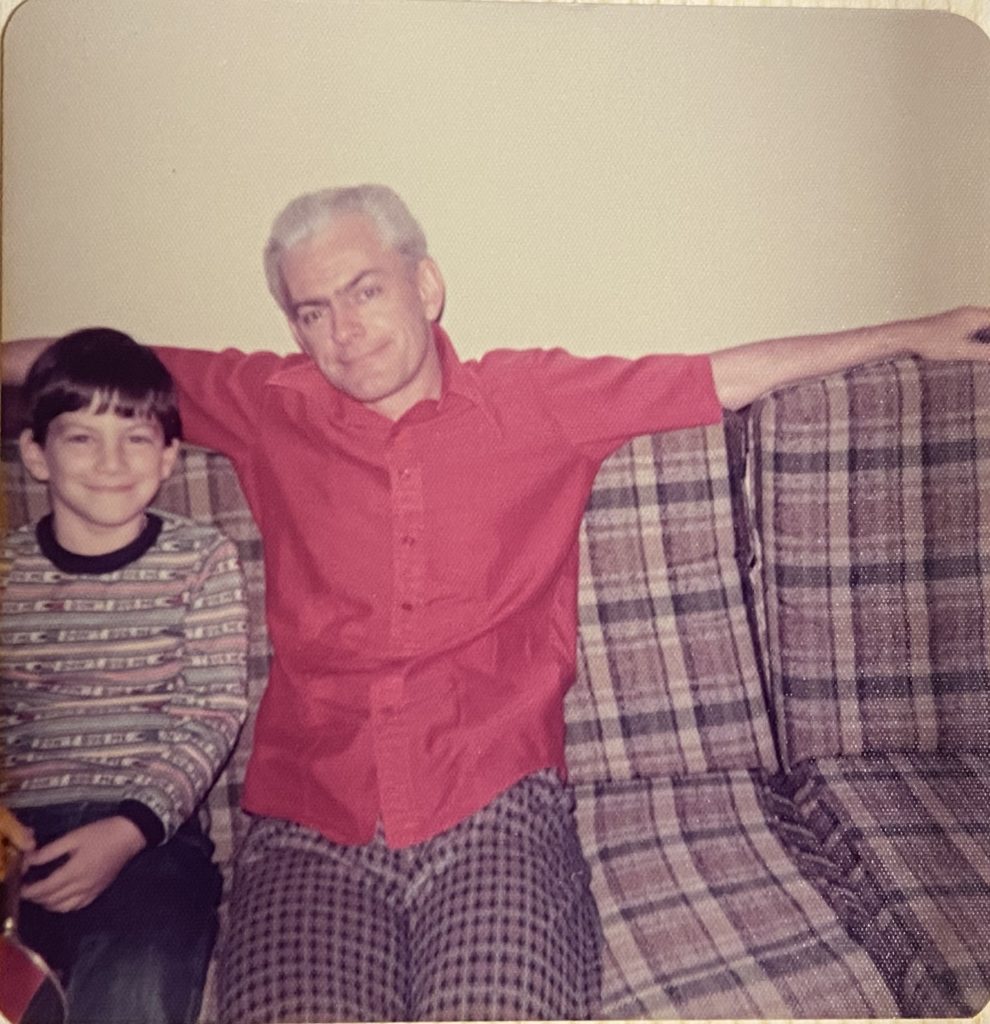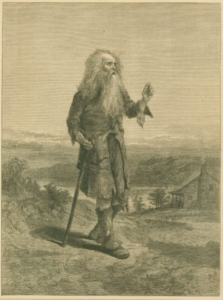But you can also find me at:
Bernard J. Kelly—Eulogy

The first time I ever spoke up here I was 12 years old and a student at St. Damian. I recited a reading for that week’s mass. As a quiet kid it was a big deal, and an attempt to break out of the shell everyone told me I was in. I did it without passing out or running away so…a major success. My homeroom teacher, however, gave me a typical back-handed compliment, “Good job, Danny. I just wish you could carry a microphone all the time so we could hear you.”
I don’t remember if I mentioned all this to my father, but I’m sure he would have been impressed that his introverted son made a game effort at public speaking. Bernard J. Kelly, of course, was an consummate speaker. If you met him, you remember that voice. Deep and distinctive. Able to cut across the noisiest room, but never obnoxiously so. That tremendous voice was diminished by Parkinson’s, but he was always able to make himself heard.
It’s an understatement to say he was an exceptional and uncommon man. Most only saw the topmost layer. The elegant gentleman with the sonorous voice. The politician who served Oak Forest in several offices, including mayor. The triple-degreed scholar who attended MIT and U of C, and pursued a career in law as a third act. All impressive. He always stressed and demonstrated a strong sense of duty and constant betterment.
But what always stood out for me was Dad’s insatiable curiosity. Growing up I knew few adults with any interests beyond their jobs and sports. Dad, however, found life terribly interesting. He didn’t have a favorite subject. He had many. Politics, city management, geopolitics, war, water treatment, chemistry, the law, survivalism, science-fiction, cartoons and comics, and old movies… How many people can run a city and also hold forth on schlocky sci-fi and horror films? Very few, I think. When my friends met him they always said I made more sense. He was a very strange and very normal man. My hero.
As much as Dad could lecture on the above and other subjects, he was irritatingly tight-lipped about his past or personal matters. When he did share, it consisted of intriguing bits about old Chicago. His boyhood pet the rooster… Riding the streetcar to Riverview… Bicycling to Starved Rock… I think I recall him mentioning climbing onto the roof of the Museum of Science and Industry as a lad, but I can’t confirm that bit of derring-do. Maybe he wanted to discourage me from following in his footsteps. Regardless, Dad’s reserved nature never interfered with his desire to reach out and help others.
Despite what society suggests, loudness does not translate into effectiveness or admirability. As a leader and politician he was known for honesty, integrity, seriousness, and a deep intelligence. Amongst the plaques hanging on our front hall wall, I remember one with a gavel presented to Dad in gratitude for his service. The inscription reads, “Speak Softly and Carry a Big…” The quote is part of an African proverb favored by President Teddy Roosevelt. In full, it states “Speak softly and carry a big stick; you will go far.” Meaning, negotiate peace, but show off your strength.
But Dad—who was fond of weaponry—never felt the need to strut, puff out his chest, or rattle his saber to get things done. He owned two sabers, by the way, so he could have. I imagine he brought Lake Michigan water to Oak Forest and helped the town grow from a village into a city through his usual tools of debate, diplomacy, and quiet strength. To my mind, and thinking of the many life lessons he imparted, the most impressive and important things in this world labor in relative silence. The atmosphere. The continents. Water. Forests. I suspect Dad would have made an excellent redwood
I wish he’d explored his creativity more often. He occasionally mused about writing a science-fiction novel, but I don’t know how serious he was about that. I would have read it. I remember a few times when he broke free of his usual stern persona. My happiest childhood memories of dad are of the times he allowed himself to be playful. When I had the chicken pox I lied there in my childhood bed, in the dark, miserable. He came home from work and visited me, still wearing his suit and tie. He asked me how I was.
“I have chicken pops,” I believe I said.
He took my Dapper Dan doll, uncapped a black felt-tip pen, and dotted Dan’s face.
“Now he has them too,” he said, followed by one of those fake “Ha ha ha’s” he uttered when he was joking around. I was delighted.
Another time we recorded sound effects for a classroom play together. H.G. Wells’ The Invisible Man. We shared a love of the old Universal Classic movie monsters, so how could he refuse? In one scene, the Invisible Man smashes through a window to escape an angry mob. The sight of Dad in work gloves, using a hammer to shatter an empty whisky bottle over a garbage can while I recorded it with his Dictaphone amazes me still.
He had a dry wit; almost Saharan at times. But he also always had all the best words, excelling at toasts, spontaneous speeches, and everyday inspiration. My daughter Flannery tells me that when she was much younger, she told him she wanted to be a butterfly when she grew up. He informed her she couldn’t be one…but she was as beautiful as one already. If you didn’t know, when he visited Ireland, Bernard J. Kelly kissed the actual Blarney Stone.
Dad was a quiet but never passive presence. He kept himself to himself, but never too much. He was generous with his time and knowledge, and not just for the community. He was always there for us—JoAnn, Nancy, Loretta, Eileen, and me—attending band and choir concerts, spaghetti dinners, graduations, weddings, baptisms, business endeavors, elections, real estate closings, and more. He was especially there for Mom, whom he adored and thanked God for. While the word cuddly was never once used to describe Bernard James Kelly, his love and affection for Mom was palpable. Whenever he used the word we in a statement, he wasn’t affecting a Queen Victoria pose. He meant him and Mom. Just as often he meant the whole family. He chose us over an extended role in politics, for example. He made several wise decisions for our benefit as well. While Dad would rarely admit he was wrong, he always addressed his mistakes. He quit smoking. He gave up drinking. He added many more years and much more good to his and our lives as a result. I consider those two of his greatest accomplishments.
*****
Dad’s wood-paneled basement den was a place of refuge and inspiration for both of us. Two couches, a long table and folding desk I think he built himself, a battered gold upholstered chair beside a end table with a lamp…and hundreds of books on a thousand subjects on every wall. Books were revered in our house. I was given free rein of the library, and it was here that I discovered several writers and cartoonists I still admire: Ray Bradbury, Oscar Wilde, Charles Addams, Gahan Wilson, Mark Twain, and others. One quotation I recall chuckling over with Dad came from Mark Twain, who said:
“When I was a boy of 14, my father was so ignorant I could hardly stand to have the old man around. But when I got to be 21, I was astonished at how much the old man had learned in seven years.”
I never had that experience. Even when we disagreed—and we disagreed more than once—I always knew my father was one of the wisest, smartest, most conscientious, and dutiful people I knew or ever would know. He was a thinker and doer who left the world and his family safer and richer for having known him. We’ll never see his like again, and we dearly miss him.
Take care, Dad.
I Stopped Blogging…
And nobody noticed. I stopped writing, and nobody noticed but me.
Definitely at the “why bother?” stage of my career.
The Lack of the New

One of the drawbacks of this “blog a day” business is that I work at home. Subsequently, I lack my former pre-pandemic benefit of working downtown. The commute was a pain in the ass, but at least I was guaranteed to see something new and different every day. On my 25-minute stroll from the train station to the office and back again, I would see such strange sights. Familiar figures, like the “FBI RAPES ME DAILY: HUNGER STRIKE DAY X” guy near the Daley Center or Walking Man (RIP) in any number of places. The lampposts and walls were papered with street art, kook rants, and other ephemera. There were great places to eat, buildings to admire, free newspapers to peruse, museums to visit, and of course, the staggering vastness of the lake to the east.
Not always, of course. I worked in the Loop for some 21 years (and for two years in the early 90s). When I started working the steady decimation of the old city had been in play for several decades. You could still see and experience some of what used to be in the early part of the 21st century. But every day I watched more structures coming down, more chains moving in, and more unnecessary touristy and upper-tier inhabitant crap installed. I made a goal to walk the Loop from end to end before it was all gone, and I recorded as much as I could. I only wish I’d had a digital camera earlier on in my walks. By 2020, most of my favorite places were gone.
And yet, I still had the Art Institute, Grant Park, weirdo buildings like the I AM Temple and the former Medinah Shrine, Mallers Deli and the Pittsfield Cafe, many different pretty lobbies with friendly guards who let me look about, and so on.
Now I sit and work and look out the front window of my home, wondering who the hell half these other people are walking about MY neighborhood (I am a grumpy middle-aged man; this is my charge). I sometimes stroll to the lake, now a mile east, not just outside my office window. I get a coffee at Astra or a brownie at Sally’s Nuts and look at old Jens Jensen’s memorial to Augusta Rosenwald in the park named after him. It’s nice. It’s quiet. Occasionally too quiet.
I need more new.
Mortality
 One of the dumber fictional ideas humans have had is that immortality, or more “realistically” a very, very long and healthy life measured in millennia, would be unbearable. Given that extra-long lifespan, only an unimaginative soul wouldn’t find multiple worthwhile somethings to do along the way. We have the notion that losing people would be especially torturous, but would it be any worse than losing them while grey-bearded, half-mad, and near-death oneself?
One of the dumber fictional ideas humans have had is that immortality, or more “realistically” a very, very long and healthy life measured in millennia, would be unbearable. Given that extra-long lifespan, only an unimaginative soul wouldn’t find multiple worthwhile somethings to do along the way. We have the notion that losing people would be especially torturous, but would it be any worse than losing them while grey-bearded, half-mad, and near-death oneself?
I like the TV show The Good Place, but even that show thought a few billion years in Heaven was enough for a life in a challenging eternally customizable paradise. No one even considered the possibility of offering people the option to erase and reboot themselves, letting them enjoy that sense of accomplishment again and again and again.
What a crock. To believe that in a literal perfect world we’d eventually choose oblivion. Certainly it beats the existing alternative of hoping you have enough funding to reach a hundred years in a disintegrating meat machine.
St. Vivian the Obscure
 Today’s blog addresses the piece of writing I worked on today. A well-overdue review of a book about Chicago’s Vivian Maier. Vivian, if you don’t know about her, worked as a nanny for most of her life and semi-secretly made a vocation of photography. Through the middle of the 20th century, Vivian snapped pictures of people on the street, self-portraits, urbanity and urban decay, and, as a strange sidebar, newspapers and documents, page by page. Vivian seemed uninterested in earning a living as a photographer. Good as she was, photography seemed more of an obsession than a means of self-expression. Afflicted with hoarding syndrome that grew worse with age, Vivian took tens of thousands of pictures, printed some, but mostly sacked away thousands of rolls of undeveloped film. When she died, few folks knew she’d been a serious photographer.
Today’s blog addresses the piece of writing I worked on today. A well-overdue review of a book about Chicago’s Vivian Maier. Vivian, if you don’t know about her, worked as a nanny for most of her life and semi-secretly made a vocation of photography. Through the middle of the 20th century, Vivian snapped pictures of people on the street, self-portraits, urbanity and urban decay, and, as a strange sidebar, newspapers and documents, page by page. Vivian seemed uninterested in earning a living as a photographer. Good as she was, photography seemed more of an obsession than a means of self-expression. Afflicted with hoarding syndrome that grew worse with age, Vivian took tens of thousands of pictures, printed some, but mostly sacked away thousands of rolls of undeveloped film. When she died, few folks knew she’d been a serious photographer.
Then certain men found her photographs after buying the contents of several unpaid storage units. Vivian was declared an unrecognized genius (some of her photos were quite nice, possessing Weegee-esque and Arbusian aspects), the price of her photographs soared, and Chicago adopted her as one of our many weirdo saints (St. Veronica, shown, is the official shutterbug saint for the Catholic Church, by the way). The book I read did a good job of discovering where Vivian came from, what much of her life was like, and why she took photographs. Finding out who she really was, however, will always be an impossibility. Especially now that others who stand to profit from her work most benefit from defining her.
You’ll see.
Bloggity Blog Blog Blog
Coming up with a topic for a quick paragraph here every day is already a challenge. I know there are people who can sit down and regale you with tales of their dental appointment, baking escapades, and foot care regimen, but… Well, I could probably do that too. Babbling in print has been my day job for years, and also my night job when it comes to the freelance stuff. But I’ve long hated the idea of the literary trots. Some writers could stand to shut up their pen once in a while. Oh, some got very good at jotting down exactly 2000 readable words on assorted subjects, but doesn’t a non-stop flow of words devalue what you say? I can name several pundits off the top of my head who could stop and recycle columns they dashed off years ago…and no one would be the wiser, in all senses of the word.
Which is not to say that I’m bringing a sack of dazzling jewels whenever I deign to slam words together. At the same time, I try to never cheat the reader. You see this…this verbal construction I’m sharing with you here is what I called a “ramble” in my LiveJournal days (as opposed to a “rant,” which was more of an angry ramble). Back then, before Twitter, I’d turn out a few hundred words a day on this, that, and the other thing (often on my employer’s dime; relax, I got my work done). A few fellow writers said I was wasting my time, but I was simultaneously getting published in the papers, so I didn’t see the issue. I liked the immediacy of blogging and the ability to write about things I knew I’d never see published in “legit” newspapers and magazines. The blogging days were fun. As fun as the zine days. And both helped me keep my interest in this writing nonsense, even as the “real” writers clucked and mocked us hobbyists, knowing they’d NEVER be toppled from their inky perches.
So there. A blog about blogging. To quote my friend Kathy: META.
Third Coast Review
I have a fellow writer friend who shares the things he’s grateful for everyday, without fail. I’m far too much of an ingrate to do that, but it might be worth it to mention the things I do to keep busy and push this wobbly-wheeled wagon I call a writing career further along.
For instance, Third Coast Review. This is a local (Chicago) site that appeared after Gapers Block shut down, and several GB writers wanted to carry the torch. I wasn’t one of them; I heard about TCR later. I contributed a few reviews early on, and when the previous Lit editor left I volunteered. It’s been fun, I’ve met interesting folks who became regular contributors, and I’ve discovered new books, authors, and publishers I wasn’t aware of before. It’s been a good experience.
Here’s the first TCR Lit article of 2023. I’m always looking for new writers/reviewers and Chicago authors, publishers, and Lit subjects to cover. If any of those apply to you, contact me: dan@mrdankelly.com.
Unmaking Christmas
Note: These daily blogs are intended to help me keep my hand in at writing. Also, notes for possible future articles and suchlike. Don’t look for finished work here. I’m experimenting!
 Putting away the Christmas decorations is never a sad thing for me. It’s one last whirl of holiday glee. One last whiff of cinnamon, pine, sugar, and the many little bits of everything used to create ornaments. One last unwrapped gift, removing the lights, garland, and other trinkets and knickknacks, revealing the parched but still proud tree beneath. Yes, it needs to go, but also, yes, it can be ground up and mulched and spread to protect and promote growth elsewhere. One last goodbye, at least for a year, to a fleet of Santas, reindeer, snowmen, elves, angels, Krampuses, and other mythological creatures adorning the tree, mantel, furniture, and more. How can you be unhappy revisiting all that glamorous, glitzy, glittering ridiculousness? Plus, you can finally see the floor again, fercrissakes. Farewell, Christmas. Return from whence you came: the attic.
Putting away the Christmas decorations is never a sad thing for me. It’s one last whirl of holiday glee. One last whiff of cinnamon, pine, sugar, and the many little bits of everything used to create ornaments. One last unwrapped gift, removing the lights, garland, and other trinkets and knickknacks, revealing the parched but still proud tree beneath. Yes, it needs to go, but also, yes, it can be ground up and mulched and spread to protect and promote growth elsewhere. One last goodbye, at least for a year, to a fleet of Santas, reindeer, snowmen, elves, angels, Krampuses, and other mythological creatures adorning the tree, mantel, furniture, and more. How can you be unhappy revisiting all that glamorous, glitzy, glittering ridiculousness? Plus, you can finally see the floor again, fercrissakes. Farewell, Christmas. Return from whence you came: the attic.
Remembering Regret
 When I was younger, I was filled with a constant sense that I had to accomplish certain things, or else I’d regret it. I pictured my fifty-something self, fat and balding, half-mad, half-blind, and filled with hate, looking back and wishing I’d grabbed the gusto in my youth. Well, the view is different from here. I don’t remember any of the dares I declined, even after I was told by my friends that I’d regret not taking them. Most of the potential lovers’ names escape me, and the trysts I had were forgettable. I’ve achieved much of what I set out to do (though perhaps not as successfully as I might have liked), and I suspect that if you presented me with a list of the goals I made in my twenties, I wouldn’t recognize half of them. Finally, in my experience, the things I build up the most in my mind most often disappoint me. That probably goes for the aforementioned goals too. Regrets, I’ve had a few, as the song goes, but then again, too few to mention. Above all, let us give thanks for encroaching senility.
When I was younger, I was filled with a constant sense that I had to accomplish certain things, or else I’d regret it. I pictured my fifty-something self, fat and balding, half-mad, half-blind, and filled with hate, looking back and wishing I’d grabbed the gusto in my youth. Well, the view is different from here. I don’t remember any of the dares I declined, even after I was told by my friends that I’d regret not taking them. Most of the potential lovers’ names escape me, and the trysts I had were forgettable. I’ve achieved much of what I set out to do (though perhaps not as successfully as I might have liked), and I suspect that if you presented me with a list of the goals I made in my twenties, I wouldn’t recognize half of them. Finally, in my experience, the things I build up the most in my mind most often disappoint me. That probably goes for the aforementioned goals too. Regrets, I’ve had a few, as the song goes, but then again, too few to mention. Above all, let us give thanks for encroaching senility.
Gorgeosity
 One of the benefits of living in Highland Park is its closeness to Lake Michigan. Less well-known is our proximity to a series of 30 lovely ravines. While the shoreline has a number of nice beaches, it’s the ravines that stand out. Snakily winding their way into the interior, they’re large but subtle, left behind when the Ice Age’s last glaciers melted and water trickled down from the Chicago moraines, carving rough and steeply acute angles into the earth. Animal, vegetable, and mineral: all either visit or house themselves in the ravines.
One of the benefits of living in Highland Park is its closeness to Lake Michigan. Less well-known is our proximity to a series of 30 lovely ravines. While the shoreline has a number of nice beaches, it’s the ravines that stand out. Snakily winding their way into the interior, they’re large but subtle, left behind when the Ice Age’s last glaciers melted and water trickled down from the Chicago moraines, carving rough and steeply acute angles into the earth. Animal, vegetable, and mineral: all either visit or house themselves in the ravines.
We live in Ravinia neighborhood, which takes its name from our local topography. Once an independent, incorporated village back in the 19th century, Ravinia was annexed by Highland Park in 1899. Today it’s better known for the Ravinia Music Festival, which more or less began when the Chicago and Milwaukee Electric Railroad built an amusement park there in 1904. The amusement park eventually closed—the Martin Theater and the Old Gate are the only original features left—but the music played on, stopping only during the Depression and the height of the COVID pandemic. The festival brings the crowds, but the ravines its named after remain an open secret.
I wrote this because I’ve been pondering an essay or some longer work addressing the ravines. I’m no John Muir though, so I need to read up on geology, botany, biology, and more. Still, does this sound interesting to anyone out there?
